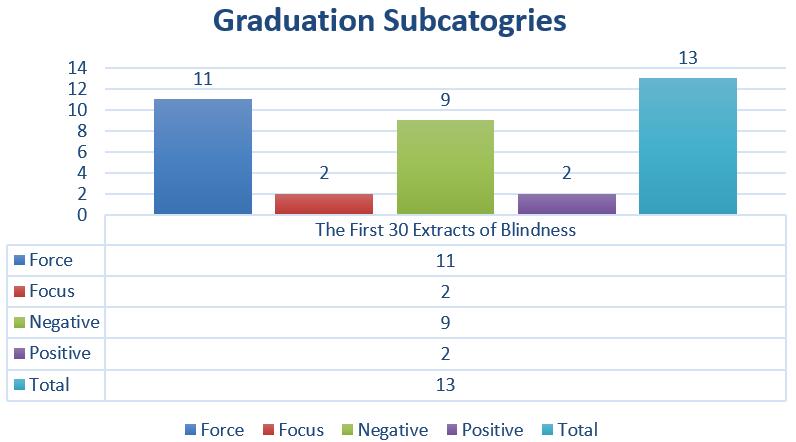The Language of Evaluation in Jose Saramago's Blindness via Appraisal Theory
Abstract
Appraisal theory is developed out of systemic functional linguistics as a discourse semantic resource that is concerned with how text producers express their attitudes. The current study is an attempt to expand appraisal framework applicability to a fictional text as modern linguistic studies in the field of appraisal theory have typically been applied to the limited scope of political speeches and debates. The present study strives to illuminate appraisal theory as a tool for analysing the novel Blindness by José Saramago by carrying out three hypotheses. First, appraisal theory can be applied to fictional texts to reveal its genre. Second, in Blindness, appraisal theory shows how the novel’s opening displays a high frequency of pessimistic attitudes. Third, Saramago's most prominent attitude in the beginning of Blindness is judgement. To investigate these hypotheses, the study applied Martin and White’s (2005) framework of appraisal theory to an analysis of 30 extracts as the most representative of the apocalyptic genre. Both quantitative and qualitative methods were applied. Consequently, this study has proven that appraisal framework can be applied to fictional texts to determine the stance and the genre of the text. The findings have also demonstrated that Saramago used an explicit judgment rather than affect or appreciation. Examining the apocalyptic genre and Saramago's attitudes through appraisal theory has led to a new linguistic reading of Blindness unfolding the stances towards the perspectives in the texts and the alignments made to the audience.
Downloads
References
Bloor, M., & Bloor, T. (2004). The Functional Analysis of English Second Edition. Arnold A member of the Hodder Headline Group.
Brezina, V. (2018). Statistics in Corpus Linguistics. https://doi.org/10.1017/9781316410899
Chagas, P. C. (2006). The blindness paradigm: The visibility and invisibility of the body. Contemporary Music Review, 25(1-2), 119-130. https://doi.org/10.1080/07494460600647543
Christie, F., & Martin, J. R. (2005). Genre and Institutions: Social Processes in the Workplace and School. In Google Books. A&C Black.
Esmaeili, S., & Zohdi, E. (2015). Panopticism in José Saramago’s Blindness. Theory and Practice in Language Studies, 5(12), 2539. https://doi.org/10.17507/tpls.0512.14
Fowler, R. (1991). Language in the News: Discourse and Ideology in the Press. Routledge.
Halliday, M. A. K. (1994). An Introduction to Functional Grammar (second edition). Edward Arnold Publishers.
Herman and Silalahi, D. E. (2020). Critical Discourse Analysis on “We are the World 25 for Haiti” Song Lyrics. Journal of English Education and Teaching (JEET), 4(1), 36-48. https://doi.org/10.33369/jeet.4.1.36-48
Herman, H., Purba, R., Sijabat, P. A., Saputra, N., Muhammadiah, M., & Thao, N. V. (2022). Investigating the Realization of Speech Function in a Speech through Systemic Functional Linguistics Perspective. Script Journal: Journal of Linguistics and English Teaching, 7(01), 31-41. https://doi.org/10.24903/sj.v7i01.917
Khalil, H. (2021). Attitude as a Tool for Critical Stylistics Analysis in Literary Discourse Some of the authors of this publication are also working on these related projects: Critical Discourse Analysis View project.
Kivunja, C. (2018). Distinguishing between Theory, Theoretical Framework, and Conceptual Framework: A Systematic Review of Lessons from the Field. International Journal of Higher Education, 7(6), 44-53. https://doi.org/10.5430/ijhe.v7n6p44
Körner, H. (2000). Negotiating Authority: The Logogenesis of Dialogue in Common Law Judgments.
Lock, G. (1996). Functional English Grammar. Cambridge University Press.
Manivannan, G., & Maran, P. (2016). The Language of José Saramago.
Martin, J., & White, P. (2005). The Language of Evaluation Appraisal in English. Palgrave Macmillan.
Moore, J., Ruffalo, M., Glover, D., Bernal, G., Braga, A., Sanders, M., & Ste, V. (2008). B L I N D N E S S: A film by Fernando Meirelles Based on the book “Blindness” by José Saramago [Review of B L I N D N E S S: A film by Fernando Meirelles Based on the book “Blindness” by José Saramago].
Nevalainen, V. M. (2020). Fictional Post-Apocalypses, with Special Reference to Cormac McCarthy’s The Road and Jose Saramago’s Blindness: A Comparative Study.
Oteíza, T. (2017). The appraisal framework and discourse analysis. In T. Bartlett & G. O’Grady (Eds.), The Routledge Handbook of Systemic Functional Linguistics. London: Routledge.
Rogers, R. (2011). Critical Approaches to Discourse Analysis in Educational Research. In R. Rogers (Ed.), An Introduction to Critical Discourse Analysis in Education. Routledge. (Original work published 2004)
Saputra, N., Fatmawati, E., Ngongo, M., Herman, H., and Thao, N. V. (2022). Transitivity Analysis on Sri Mulyani’s Speech at Singapore Summit: A Systemic Functional Linguistics Perspective. Humanus: Jurnal Ilmiah Ilmu-ilmu Humaniora, 21(2), 188-198. https://doi.org/10.24036/humanus.v21i2.116665
Simut, A. (2012). Philology. Studia Universitatis, 47(4).
White, P. R. R. (2011). Appraisal. In J. Zienkowski, J.-O. Ostman, & J. Verschueren (Eds.), Discursive Pragmatics. John Benjamins Publishing Company.
White, P. R. R. (2020, January 1). Appraisal Theory Homepage. Grammatics. Retrieved from https://www.grammatics.com/appraisal/index.html


This work is licensed under a Creative Commons Attribution 4.0 International License.
Copyright for this article is retained by the author(s), with first publication rights granted to the journal.
This is an open-access article distributed under the terms and conditions of the Creative Commons Attribution license (http://creativecommons.org/licenses/by/4.0/).









1.png)









1.png)











